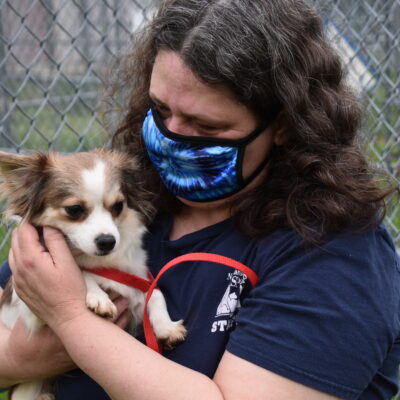Low Cost Rabies Clinics
We do not offer this service on a continuous basis. If you have missed one of our clinics, please scroll down to find other resources available in the community.
Timing of Appointments:
Appointments are spaced approximately 5 minutes apart.
We will request that you arrive on time, but note that the timing your pet(s) will be seen is approximate.
Occasionally, there may be a 10-15 minute wait. This is because some pet owners will not arrive on time as well as the fact that some animals can be unpredictable and need more time to receive their vaccine. Your patience is appreciated.
Can any dog or cat be vaccinated at this clinic:
The staff at the NHSPCA are all certified in Fear Free handling and utilize those methods. However, the pace of this clinic is very fast. Pets that are reactive to other animals or extremely sensitive to veterinary procedures, mild restraint or strangers are recommended to receive vaccines in a full service veterinary setting where veterinary staff can go very slow and the pet can avoid being around sensitivity triggers such as lots of other people, cars and animals.
If your animal has a history of biting, please have them muzzled in advance. This promotes safety for all involved.
Location:
New Hampshire SPCA
104 Portsmouth Ave
Stratham, NH 03885
What will my pet receive at this clinic:
- This clinic is for Rabies Vaccines only. Other services or vet exams are not possible.
- If your pet is pregnant, unwell, experiencing signs/symptoms of illness or has wounds of unknown origin (as in they have been outside and the source of the wound is not known), they cannot be vaccinated at this clinic.
Fee:
- The fee for the rabies vaccine is $25 per pet.
- Pet owners may secure their appointment online with a $5 non-refundable deposit and pay the remaining $20 closer to their appointment date using a pay link that will be emailed to them.
- Pet owners may also pay the remaining $20 in cash at the appointment.
1-Year or 3-Year Rabies Vaccine
Your pet qualifies for a 3-Year Rabies vaccine if both of the following are true:
- You provide the most recent Certificate of Vaccination to the New Hampshire SPCA (via upload in the online registration form or by email to clinic@nhspca.org)
- The date of the NHSPCA Clinic is not after the due date noted on that Certificate
Your pet qualifies for a 1-Year Rabies Vaccine if any of the following are true:
- You do not have an up-to-date Certificate of Vaccination
- You have a Certificate, but the due date has lapsed
- Your pet has never been vaccinated
Contact
clinic@nhspca.org
603-772-2921 x114
Missed out on one of our clinics? Here are some other resources for affordable vaccine clinics in the region:
ShotVet Clinics
https://www.shotvet.com/find-a-clinic/
PetCo
VetCo Clinics
https://www.vetcoclinics.com/services-and-clinics/clinic-locations-and-schedules/?zip=03235&formclinic_state=
Tractor Supply
Vip Pet Care Clinics
https://www.vippetcare.com/find-a-location/
Rabies Facts
Rabies is a fatal animal disease that is naturally communicable to humans (zoonotic). Transmitted through the saliva of an infected animal, bite wounds are the most common method of infection, but any contact with saliva to an open wound or sore can cause infection. Fox, raccoons, bats and skunks are the most common mammal to catch, carry and spread the rabies virus.
How can I avoid exposure? Avoid contact with wildlife – dead or alive. Do not try to handle, feed or capture injured, sick or abandoned wildlife.
- Avoid animals acting strangely, especially those that are unusually tame, aggressive or paralyzed. Be suspicious of raccoons, skunks and bats that are active during the day. Call your local police department and/or Animal Control Officer.
- Avoid feeding birds and other wildlife close to your home. Birdseed attracts raccoons and other animals especially in the winter months.
- If you see a bite wound, scratch or any other injury on your pet, do not touch it with bare hands. WEAR GLOVES and wash the wound thoroughly with soap and water. Contact your veterinarian immediately.
How can I protect my pets?
- Vaccinate your pets and keep them indoors when you are not at home.
- Make sure all dogs and cats are up to date with rabies and all other vaccinations, even if they are strictly indoor pets (even indoor pets can sneak out).
- Do not leave garbage, pet food, birdseed or other foods out that may attract wildlife or stray animals.
What if I am exposed?
- Don’t panic!
- Seek medical attention immediately.
- Call your doctor or go to the emergency room of a nearby hospital.
- Report the bite to the local police or health department so the animal can be located and observed or tested for signs of rabies.
- Do not let anyone destroy the animal.
- Under NH State law, a cat or dog must be confined and observed for 10 days following the day of the bite.
A Rabies vaccination is not enough!
The NHSPCA strongly recommends that your pet receive regular annual veterinary care and any other vaccines deemed appropriate for your pet’s lifestyle by your veterinarian.

